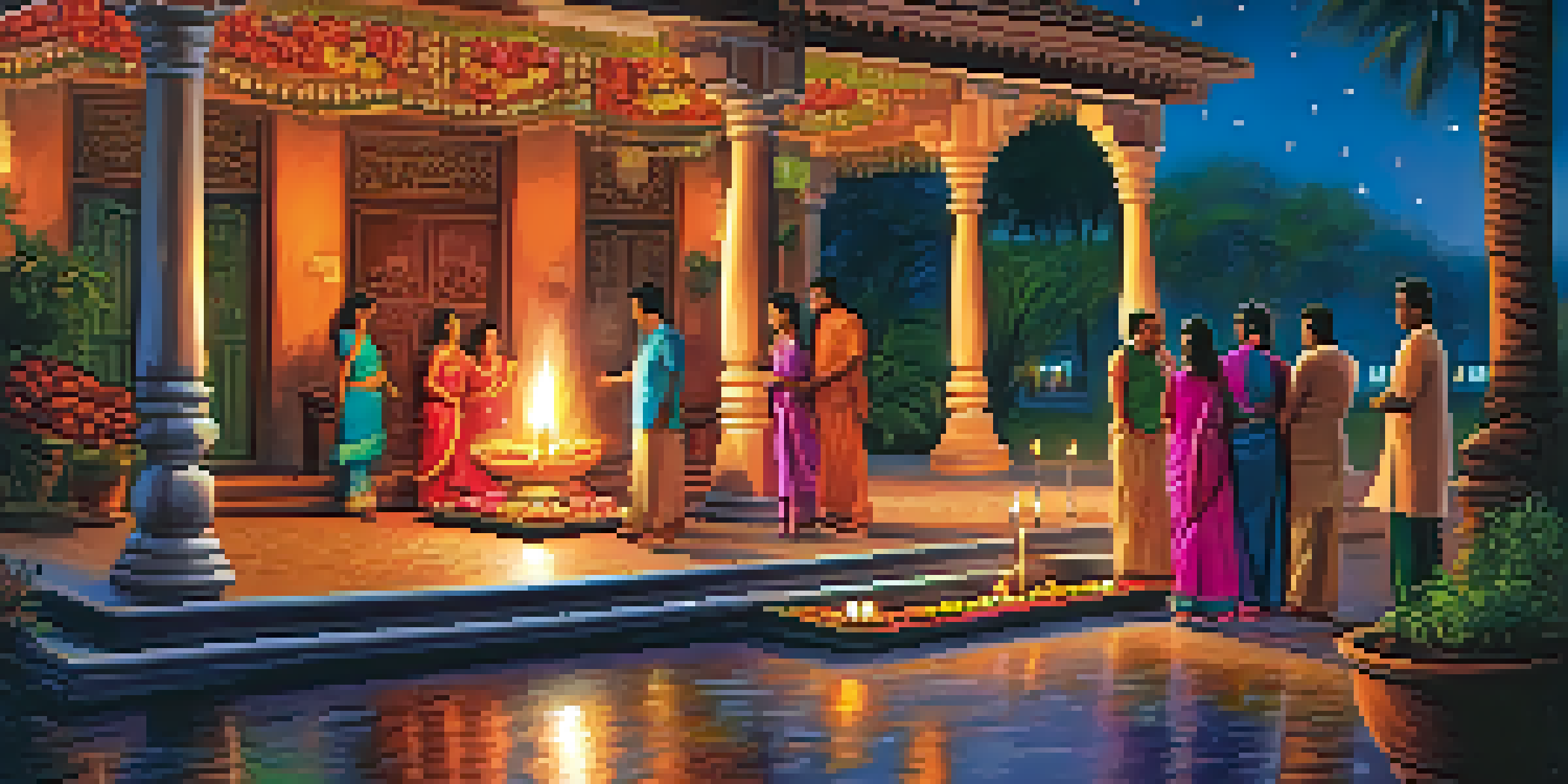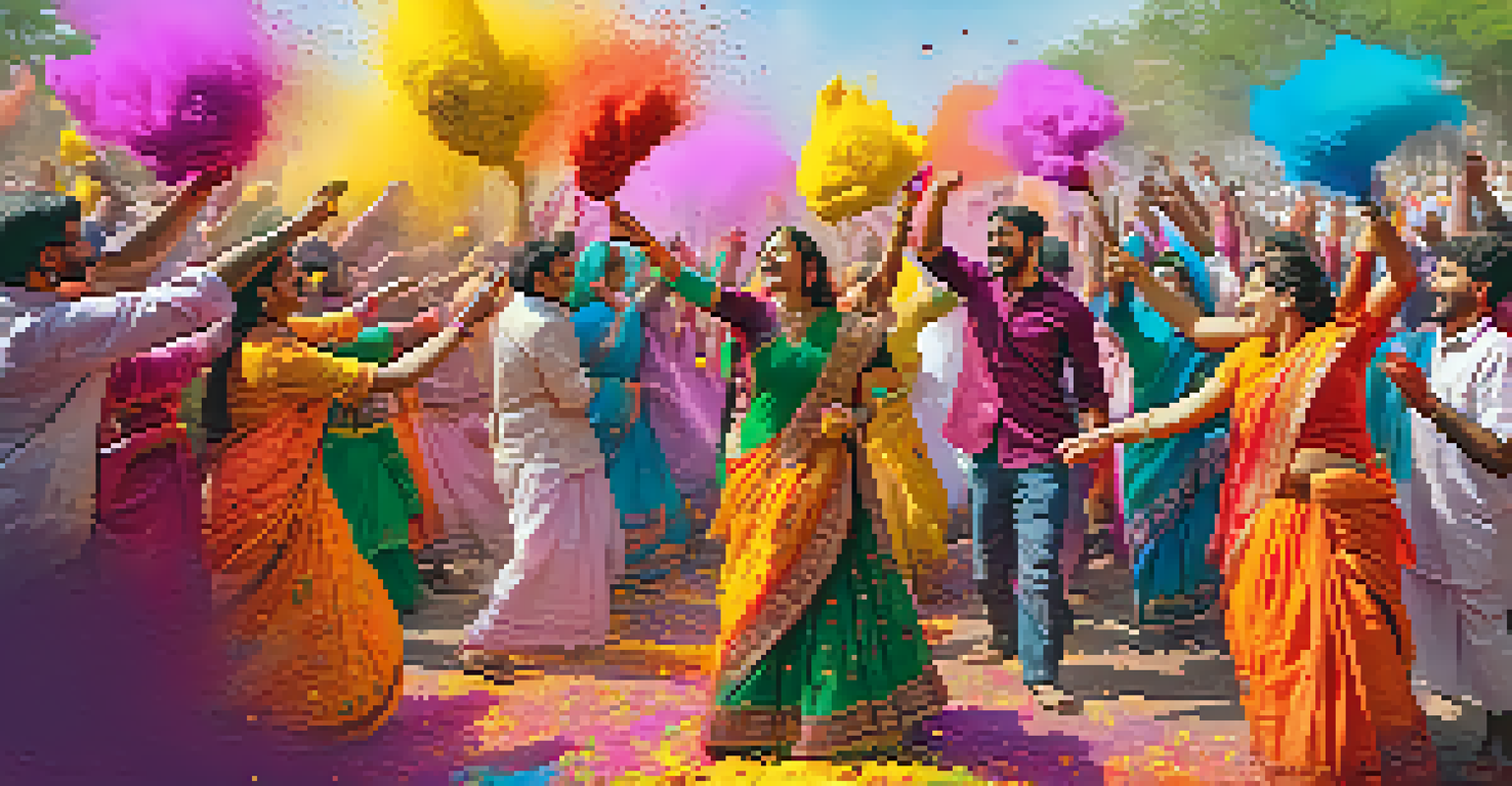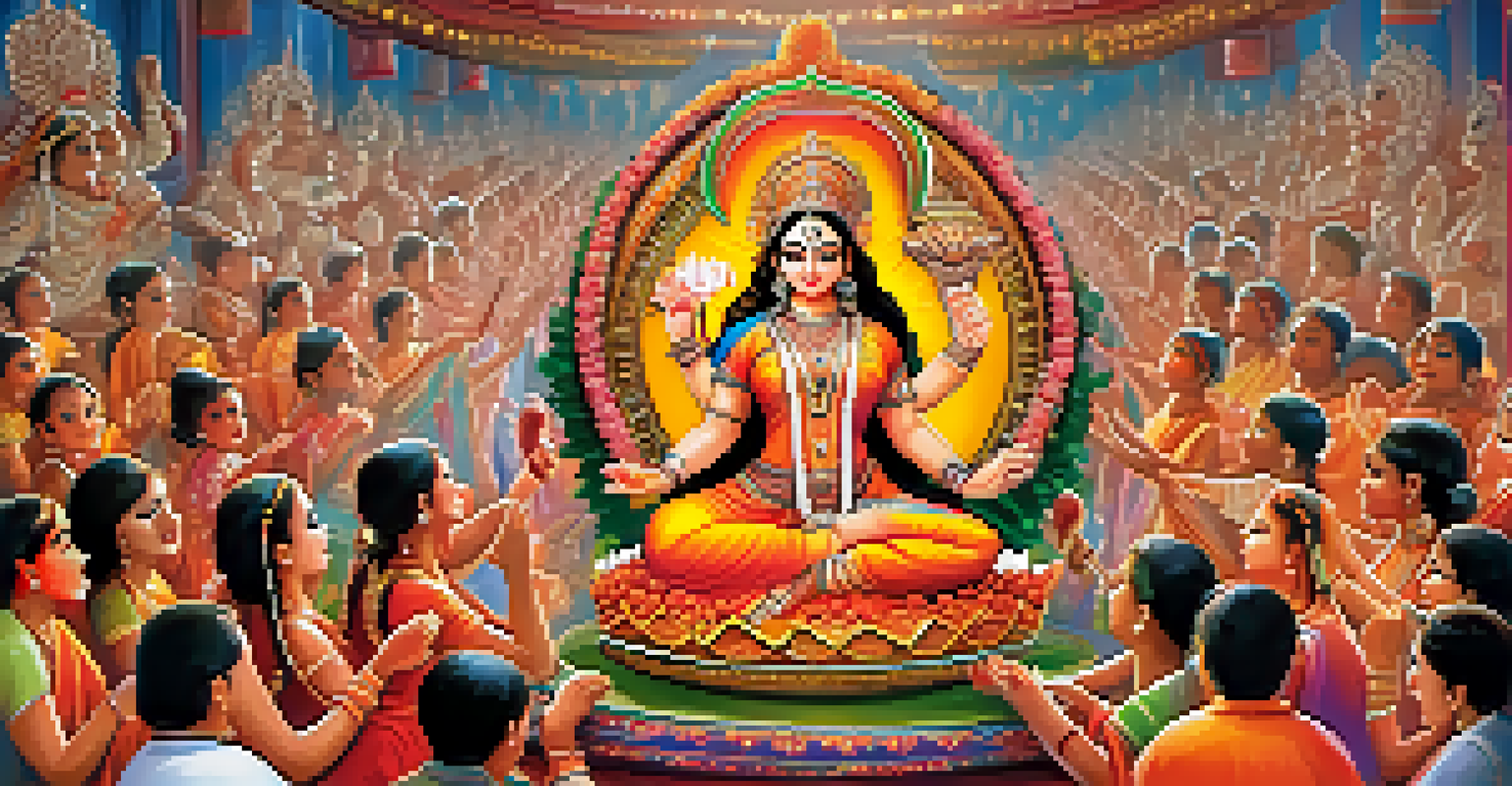Festivals of India: Celebrating Mysticism Through Tradition

Introduction: The Essence of Indian Festivals
India is a land rich in culture and diversity, and its festivals reflect this vibrancy. Each celebration is steeped in history, rituals, and a sense of community. From the colorful lights of Diwali to the somber reflection of Mahashivaratri, festivals are an integral part of Indian life, infusing everyday moments with joy and spirituality.
Festivals are a time to give thanks and to connect with those we love.
These festivals not only mark significant events but also serve as a reminder of the country’s mysticism and deep-rooted traditions. They provide a unique opportunity for people to come together and celebrate the shared values that bind them. In a world that often feels disconnected, these gatherings foster a sense of belonging and continuity.
As we delve into the various festivals of India, we will uncover how they encapsulate the essence of this mystical land, weaving together ancient practices and modern interpretations that resonate with all generations.
Diwali: The Festival of Lights and Good Over Evil
Diwali, often referred to as the Festival of Lights, is one of the most celebrated festivals in India. It symbolizes the victory of light over darkness and good over evil, making it a powerful reminder of hope and renewal. Homes are adorned with diyas (oil lamps) and rangoli (colorful designs), creating a vibrant atmosphere filled with joy.

The festival spans five days, with each day holding its own significance, from honoring Lakshmi, the goddess of wealth, to celebrating the bond between brothers and sisters. Families come together, sharing sweets and gifts, while the night sky illuminates with fireworks, symbolizing the triumph of positivity. It’s a time for reflection and gratitude, as well as a celebration of community.
Celebrating Diversity in Festivals
Indian festivals reflect the country's rich culture and diversity, bringing people together through shared rituals and community spirit.
Diwali beautifully captures the mystical spirit of India, showcasing how tradition can bring people together while inspiring them to embrace a brighter future. The rituals and customs surrounding this festival create lasting memories, reinforcing the importance of family and community.
Holi: The Colorful Festival of Love and Unity
Holi, known as the Festival of Colors, is an exuberant celebration that marks the arrival of spring and the triumph of love. It's a day when people throw colored powders at each other, dance, and share festive foods, creating a joyful atmosphere that transcends social barriers. This vibrant display of color is not just fun; it symbolizes the spirit of unity and togetherness.
The beauty of the world lies in the diversity of its people.
The origins of Holi are steeped in mythology, with tales of Lord Krishna and Radha highlighting the themes of love and devotion. As people gather to play with colors, they also come together to forgive past grievances, reflecting the festival's underlying message of reconciliation and joy. It’s a reminder that amidst the chaos of life, love and laughter are what truly bind us.
Holi's mystical essence lies in its ability to transform the mundane into the extraordinary, encouraging individuals to let go of their inhibitions and embrace the happiness of the moment. This festival serves as a beautiful metaphor for life itself—colorful, unpredictable, and best enjoyed with others.
Navratri: A Nine-Night Celebration of the Divine Feminine
Navratri, which translates to 'nine nights', is a festival dedicated to the worship of the goddess Durga. Each night is marked by elaborate prayers, dances, and rituals that celebrate the divine feminine energy. This festival is not just a spiritual journey but a cultural extravaganza filled with music, dance, and vibrant attire.
As devotees participate in Garba and Dandiya, traditional dance forms, they express their devotion and joy through movement. The festive atmosphere brings communities together, fostering a sense of belonging and shared celebration. It's a time when age-old traditions are passed down, uniting generations in reverence and festivity.
Festivals as Spiritual Journeys
Each festival in India serves as a spiritual journey, encouraging individuals to connect with their traditions and embrace values of love, gratitude, and unity.
Navratri encapsulates the mysticism of India, illustrating the importance of the feminine principle in spirituality and society. It serves as a reminder that strength and grace coexist, encouraging individuals to honor both within themselves as they navigate the complexities of life.
Eid: A Celebration of Faith and Togetherness
Eid, celebrated by millions of Muslims across India, marks the end of Ramadan, a month of fasting, prayer, and reflection. It is a joyous occasion filled with communal prayers, feasting, and acts of charity. The festival fosters a sense of unity among families and communities, reinforcing the importance of togetherness and gratitude.
On Eid, the atmosphere is filled with the aroma of delicious dishes, as families come together to share meals that symbolize abundance and love. The practice of giving Zakat, or charity, highlights the significance of helping those in need, reinforcing the festival's core values of compassion and generosity. This act of giving is a reminder that true wealth lies in the happiness of others.
Eid beautifully reflects the mysticism of faith, encouraging individuals to connect with their spirituality while fostering bonds with their loved ones. The celebration transcends religious boundaries, inviting everyone to partake in its spirit of joy and togetherness.
Pongal: A Harvest Festival of Gratitude and Prosperity
Pongal, celebrated primarily in Tamil Nadu, is a harvest festival that pays homage to the sun god and farmers. The festival lasts for four days and is marked by the preparation of a special dish called Pongal, made from newly harvested rice, jaggery, and milk. This dish symbolizes abundance and gratitude for the year’s harvest.
During Pongal, homes are decorated with kolams (rice flour designs), and people engage in various rituals to honor nature and the hard work of farmers. The essence of the festival lies in its communal spirit, as families and neighbors come together to celebrate the bounty of the earth. Children play traditional games, and the air is filled with laughter and joy.
Community and Togetherness
Festivals foster a sense of belonging and togetherness, reminding us of the importance of community in navigating life's complexities.
Pongal exemplifies the mysticism of nature’s cycles, reminding us of the importance of gratitude and respect for the earth. It encourages individuals to reflect on their connection to the land and the community, fostering a sense of harmony and appreciation.
Durga Puja: A Grand Tribute to the Goddess
Durga Puja is a significant festival celebrated predominantly in West Bengal, honoring the goddess Durga's victory over the buffalo demon Mahishasura. This elaborate celebration lasts for ten days, culminating in grand processions, artistic idol displays, and cultural performances. The festival showcases the rich tapestry of Bengali culture while emphasizing the power of good over evil.
During Durga Puja, communities come alive with vibrant decorations and intricate pandals (temporary structures) that house the idols. The air is filled with the sounds of traditional music and the scent of delicious Bengali cuisine, creating a festive atmosphere that draws people together. It's a time for celebration, reflection, and reverence.

The mysticism of Durga Puja lies in its ability to unite people in a common cause, reminding them of the strength that lies within. This festival serves as an inspiring reminder of resilience and the eternal battle between light and darkness, encouraging individuals to embrace their inner strength.
Conclusion: Embracing the Mysticism of Indian Festivals
Indian festivals are more than just celebrations; they are a profound expression of culture, spirituality, and community. They embody the mysticism that permeates every aspect of life in India, reminding us of our shared humanity and the values that connect us. Each festival is a unique experience that invites individuals to reflect, celebrate, and grow.
As we navigate through life, the lessons learned from these festivals can guide us in fostering stronger relationships and a deeper understanding of ourselves and others. The rituals, stories, and communal experiences enrich our lives, providing a sense of purpose and belonging in an ever-changing world.
In celebrating these vibrant festivals, we not only honor our traditions but also embrace the mysticism that makes life truly magical. So, whether it’s the colors of Holi or the lights of Diwali, let’s cherish these moments that bring us closer to each other and to the essence of life.